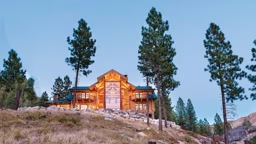Everyone has those dreams of picking up and moving someplace far away. Those visions of land as far as the eye can see, of a place to set down roots, a place to call your own. Before setting down your life savings, however, it's important to know a few of the ins and outs of purchasing property. Whether you're looking at a piece of land in rural West Virginia or acres of pristine Colorado mountainside, some truths of land purchase are universal.
Although all areas have different laws and regulations specific to their own geographic region, certain rules of thumb will help make the purchasing process easier and ultimately increase your enjoyment of the new parcel you might soon call home. As the old real estate mantra goes, "Location, location, location" is indeed everything. When the tickle to buy first strikes, it's important to think about what you really want from this piece of land. Ideally, you'll build on it and spend a significant amount of time there. But each location makes individual demands on its owner. It's important for you to decide ahead of time--before you even hop on the Internet and start investigating parcels--”how isolated you want to be or how rural you actually want your land to be.
"We sell property in Montana and Wyoming," says Scott Joyner, sales manager and broker for Rocky Mountain Timber, located in Montana. "Snow can be 20 feet deep in those mountains, so you need to decide if you want year-round living or if you just want a summer cabin site." Year-round living requires year-round road access, whereas summer spots can afford to be a little more secluded. Sometimes a big move affects more than just your wallet. It can change your whole way of life.
"People have to be realistic about the lifestyle change," says Dan Frank, co-owner of Landline Real Estate in Medford, Oregon. This move can mean a change in your professional life as well as your personal life, especially if it suddenly becomes more difficult to get into the city or you find yourself farther away from big business. Economic realism is part of the buying process. Once you've made those important choices, though, it's time to start shopping around. And shopping means lots of research. Decide what kind of area you want to live in. Are you looking for breathtaking views of snow-capped mountains, or do you dream of antelope herds grazing peacefully on flat, endless land? It's all about your personal dream. It's important to narrow down your field of options, then begin researching the specifics of those locations.
"Rural land can be highly regulated," Dan says. "There are planning and sanitation rules." And these rules and regulations might come back to affect you later on, which is why it's vital to work with a qualified real estate agent. "Sometimes when people buy land, they'll later realize it's an illegal parcel or there are access problems," he adds. "You need a specialist, especially in rural real estate." Review your agent's qualifications. Calls to the Better Business Bureau or a few satisfied customers might pay off in the long run. "People who aren't frequently involved in real estate can be easily tricked by verbiage in a contract," Scott says. "And there are people who won't intentionally try to trick you, but might unintentionally make a mistake. You're buying the American dream. This is important."
With your agent's number memorized and your geographic search area narrowed, it's time to focus on the property itself. Finding an affordable parcel can be surprisingly easy. Many real estate companies have web sites so buyers in West Virginia can scope out the Rocky Mountain vistas of Colorado and beyond. If you find a parcel and decide it's the one, there are a few more preliminaries that need to be addressed before you can sign and seal those final papers. Determining road access is vital, as is deciphering the maze of utilities necessary to keep your house heated and lit. "You need to know if there are power and phone lines there," Scott says. "Or determine if you're going to use a cell phone and alternative energy." Many land owners do choose to go without a land line, whereas other owners embrace the alternative sources of wind and solar power, rendering them independent of utility companies and helping them keep their own immediate environment clean.
The result can be impressively dependable. "If you put wind and solar power together, you would have no idea that it's alternative energy," Scott says. Determining the property lines is another necessity. Property lines should be clearly marked. Sites must be properly surveyed in order for state and local governments to issue tax bills. If a site has not been surveyed or, just as troublesome, improperly surveyed, that could mean extra costs for the land owner and potential feuds with neighbors. "We have survey caps and pins put at all corners of our properties. The caps are then stamped with parcel numbers and lines showing the direction of the property, so someone can look down on it and see the whole layout," Scott says. "I would warn against anything without a certificate of survey." Also, if the land has not been legally described, it can be difficult or impossible to get title insurance. "This factor means that if anything does go wrong with the property, like large sinkholes or toxins in the soil, the land won't be insured and you will be liable for your investment," Scott says. Next, investigate the water supply. "We recommend that buyers have a well clause, meaning that a well will be drilled as a condition of purchase," Dan says.
In other words, if your property sits atop arid soil with not a drop of water in sight, you are not obligated to purchase the land. Septic systems should not be neglected either. "Find out about the septic systems in the process of purchasing," Dan says. "Building permits have conditions with regard to septic systems. And different septic systems cost different amounts of money—for example, a sand filter versus a standard system." The septic investigation likely will lead to a percolation test, which determines how quickly waste water will percolate through soil. "How quickly it percolates determines what type of septic system is going to be installed," Scott says. If you're planning to build on your new property soon after purchase, it's important to determine the septic system immediately. "They'll ask you how big the house is going to be," Scott says, "so a system can be designed to maintain the household." Unfortunately, these tests aren't always a cinch to pass. "That's one of the fears of buyers, whether a property will test well," Scott adds. "There are areas in the country where the water table is very high, meaning waste water is more likely to mix with groundwater, which is a bad thing." Rocky Mountain Timber sells land from its own stock of properties and has a waste water system guarantee, which states that if someone is unable to get a system approved on their specific parcel, the company will let them switch to another system. Inquiring about similar guarantees is worth the extra call.
Although wells and waste systems might seem like the less glamorous aspects of land ownership, they're vital nonetheless. "A lot of people get going too fast, and they'll make house plans before drilling a well or installing a septic system," Scott says. The result can be a lot of wasted time and money. Money, of course, is key to any land purchase. Make sure you know what you're getting for your dollar, and more importantly, be realistic about how much your dollar can buy. "One of the biggest mistakes I see people making is letting price influence their decision," Scott says. "Buying a piece of property is like buying a car. You're not going to get a Cadillac for the price of a Kia. If you're expecting 20 acres of land with white-water streams filled with trout for $5,000, it's just not going to happen. You see people buying land, envisioning what it is and even though they've been told, they still have something else pictured. It's a big mistake to buy a piece of property that doesn't suit your needs."
Of course, there are numerous properties dotting the entire country, from the East Coast to the Mid-Atlantic to the Rockies and beyond, just waiting to be snatched up. And somewhere in there, nestled in the woods or hugging the shores of a bubbling stream, is your own piece of heaven. Start thinking, start planning, and soon you'll be buying.











